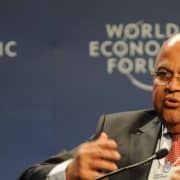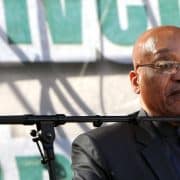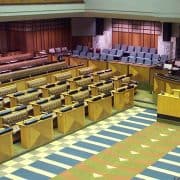|
Getting your Trinity Audio player ready...
|
By David Lewis
First published in Daily Maverick
Whistle-blowing is a critical ingredient in tackling corruption. Corrupt conduct is, in most cases, the outcome of covert collusion between a public authority or individual, on the one hand, and a private institution or individual, on the other. Unlike house robbery or assault, there is no victim with an interest in reporting this crime because all the direct parties to the act of corruption are implicated in the crime. The victims are the public. And so those intent on exposing corruption and bringing the perpetrators to book – whether the criminal justice authorities, the media or NGOs – rely on members of the public to report acts of corruption, to blow the whistle.
The problem is that members of the public are generally vulnerable to retribution at the hands of those whom they expose. They may be subordinates in an employment relationship; they may be suppliers who put at risk their relationship to the large firm whose corrupt conduct they expose; they may indeed be unable to hide themselves or protect themselves from those who may wish to physically harm or kill them.
This is why it’s universally accepted that whistle-blowers require protection. And it’s as widely understood that the most important form of protection is anonymity. There are, to be sure, downsides that arise from anonymity – it is, for example, more difficult, though not impossible, to mount a successful prosecution when the primary informant wishes to remain anonymous. But it’s accepted that the potential prejudice – essentially the loss of livelihood or even life itself – suffered by an exposed informant outweighs any of the downsides that derive from anonymity.
For this reason, one never sees principles of transparency invoked in opposition to whistle-blower anonymity. An organisation like Corruption Watch which relies upon the reports of whistle-blowers, and which also staunchly advocates for maximum transparency in the conduct of public life, never receives demands to make public, in the name of transparency, the identity of its whistle-blowers. Indeed, we go to great lengths to protect our reporting channels from infiltration. Most journalists would sooner go to prison than reveal the identities of confidential sources. Legislatures, including our own, pass laws solely intended for the protection of whistle-blowers.
And so, why the demand for an open ballot in the pending vote on a motion of no confidence?
There can be no doubt that those who vote against their official party line potentially suffer prejudice in the form of both harm to their livelihoods and harm to their persons. In the case of the ANC this is clearly and, on occasion, officially, on the record.
In a recent radio interview the outspoken ANC parliamentarian, Makhosi Khoza, revealed that she had been receiving multiple death threats and that some ANC Youth League members were planning a picket outside her house and publicly sharing her address online. Khoza said, “(T)he truth is, sometimes I do [fear for my life … If they come here they will be coming to my children, I fear for my children more than I do myself.” Threats of physical harm directed at ANC leaders and parliamentarians as powerful as Lindiwe Sisulu and Jackson Mthembu are also likely to derive from their clearly expressed concern at the fitness for office of the president, a concern that may well translate into a decision to vote for the motion, a decision that may be influenced by the threats to which they have been subjected.
Threats of harm to the livelihoods of ANC parliamentarians are also on the record. In one of their milder moments the KZN ANC Youth League demanded Makhosi Khoza’s “recall” – that is, dismissal – from Parliament. There have been calls from within the ranks of the ANC for the removal of Jackson Mthembu as Chief Whip. Indeed, implicit in the very notion of a “three line whip” is that those who defy the party whips have no place representing the party in Parliament.
It has been argued that removing parliamentarians for defying the whips would be invalid and unconstitutional. Even if this were so, it is clearly true that whatever form the retribution took, voting against the party in these circumstances would certainly be career limiting. If the Protected Disclosures Act – the statute protecting whistle-blowers – was applicable in this instance, this limitation, this form of retribution, would qualify to be described as “occupational detriment”.
These concerns are not necessarily confined to ANC parliamentarians. The official line of the opposition parties is at least as clearly expressed as that of the governing party. While it may well be the case that their members will unanimously vote for the motion, the demand that individual members be allowed to “vote their conscience” naturally extends to opposition party parliamentarians. Given that these parties are equally capable of threatening the livelihoods of their parliamentarians, they should make it clear that their support for a secret ballot is as much about ensuring that their own members are able to exercise their individual choices, as they are the ANC parliamentarians.
It might be argued that the whistle-blowing analogy is false, that ministers and parliamentarians are not whistle-blowers in the ordinary sense. This is, of course, not true – ask Mcebisi Jonas and Ngoako Ramathlodi. In the case of the motion of no confidence, it does not require a great stretch to see that, in a vote that is centred on the allegations of corruption swirling around the president, dissident ANC MPs would effectively be saying that on the evidence that they have seen, the president is not fit to remain president of the country. This doesn’t differ in principle from the government official who witnesses the manipulation of a tender award and who concludes that, on the basis of the evidence that she has seen, the award has been corrupted and that her “conscience” dictates that she acts by reporting it?
There may well be a range of other important legal and constitutional principles – for example, the separation of powers – that lead the Constitutional Court to conclude that it should not impose its will on Parliament. However, it’s extremely unlikely that they will find that it is impermissible for the Speaker to rule in favour of a secret ballot.
If this is the outcome of the recent application to the Constitutional Court then the ball will be firmly in the Speaker’s court. While it’s difficult to imagine Baleka Mbete denying the will of the president, she should at least know that by denying a secret ballot she will join the grubby ranks of those who discourage and punish whistle-blowing.
Above all, she should know that were she to refuse a secret ballot, she would again be obstructing Parliament’s ability to hold the executive to account. There is no doubt that the impunity extended to the highest offices in government – expressed otherwise, the lack of accountability – is the major impediment to confronting corruption. This should be the test for deciding whether to go with a secret ballot or an open ballot: which of the two approaches best strengthens accountability? A secret ballot is the obvious answer.








